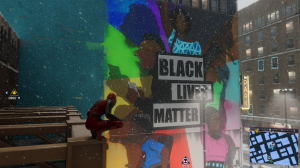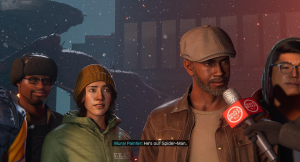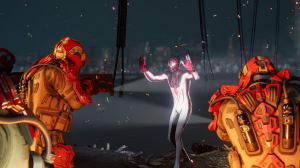102 Marvel’s Spider-Man: Miles Morales (2020)
Conversations of Race and Class in the Video Game Marvel’s Spider-Man: Miles Morales
by Nathan Greensweight
Comic Books and video games have been quickly propelling themselves to the forefront of modern storytelling, particularly with comic book movie adaptations claiming box office records, and many narrative based games finding critical acclaim. So what happens when video games get their take on comics? Enter Marvel’s Spider-Man: Miles Morales (2020). Marvel has always been forward with their portrayal of social issues and parallels with modern day reflections of society and Marvel’s Spider-Man: Miles Morales takes a very personal approach to these themes. Produced by Insomniac, the game sets the player with a new-to-the-job Spider-Man (Miles Morales), swinging through New York City, fighting criminals, and unraveling a conspiracy that could destroy his home. Throughout the gameplay Miles answers calls for help from civilians, running errands for friends, and trying to keep his identity hidden. The story is woven into the game through the main and side quests and movie quality cutscenes that integrate themselves flawlessly into the gameplay, giving an extra level of care to the narrative experience.
The protagonist Miles Morales is a 17 year old Afro-Latino American superhero who works as one of the two Spider-Heroes of New York who serve to fight crime and keep the city and its people safe. Being Afro-Latino, Miles brings a unique perspective and background to the game in comparison to the traditional White Peter Parker Spider-Man and the game explores themes of difference, diversity, community, power, and strength that all of these can give a person, with one of the narrative consultants of the game, The Haitian American writer Evan Narcisse, saying he “wanted to represent Miles’s journey to become woven into the fabric of Harlem,” rather than a hero on the margins” A few of the methods that beautifully portray this include radio shows that can be heard during gameplay that represent the possible perspectives people have on the events of the game, Miles having multilinguistic conversations with his mother and other people in New York, the portrayal of the game’s main antagonist Simon Krieger, the camera choices particularly throughout the first cutscene, and the dichotomy between Miles learning how to use his new found powers and Simon abusing his power and influence as the head of R&D for a large company.
Released in November 2020, the end of this game’s development took place during the very beginning of the COVID-19 Pandemic and saw a large series of organized marches for racial equality and justice across the entirety of the country, a topic that would be nearly impossible for a game centered on the struggle of an ethnically diverse community against a rich White businessman with his own private police force to ignore. Indeed this is reflected in the game with a mural depicting five African American men, women, and children around the phrase Black Lives Matter, which is added into the world once the player has completed all of the side quests in the game. Locking this part of the world behind 100% completion of the side missions is unfortunate but it does allow for the player to have special attention brought to it as the people you’ve helped ask you to go there for a special gift, making sure that once it is unlocked it is seen.

The struggles of power in real world America are reflected in the game both through its core conflict and in every side quest. In the main story conflict, Peter Parker goes overseas to accompany his girlfriend’s business trip leaving Miles to protect New York. He finds himself working to unravel a conspiracy and stop a war between the private funded military grade security of Roxxon Energy Corporations Simon Krieger and the urban high tech gang members of the Underground led by Miles’s old friend Phin Mason (aka the Tinkerer) . It is revealed that Roxxon has created a new energy reactor in the neighborhood of Harlem, known for its high population of African and Latin American inhabitants, but the source for this energy called newform has radioactive properties and negative health impacts on people exposed to it meaning that Simon’s plan to turn a profit would be at the expense of the entirety of Harlem, ultimately leading to Miles almost sacrificing himself to save his home. The existence of a police force working directly for the rich White man valuing profit over people’s wellbeing could not be a more blatant parallel to the pressures put on working class individuals, African Americans, Latin Americans, and other marginalized groups by the wealthy elite and how the police have acted as enforcers of this power imbalance. Miles’s own mother, Rio Morales, helps further drive home this theme home as a Latin American teacher running for city council whose platform centers on how the intrusion of Roxxon represents a danger for Harlem and the culture infused into the local businesses.
Many of the sidequests also follow similar story themes of preventing the gentrification of Harlem and the abuse of power over the everyday civilian. One of the missions deals with the condemnation of the local homeless shelter by the city after a water pipe burst and flooded. Miles finds that the cause was a clog in the drain leading into the river but he still has to reset the pumps and water pressure in the area, most of which are guarded by thugs working for a mysterious boss. Later on, Harlem businesses are having their inventory stolen and one of the business owners gets kidnapped trying to solve why. Miles follows clues from the crime scene, taking care to use his invisibility to work around the police, to a dock where more goons are guarding the missing inventory and overheard conversations reference another mysterious boss. After clearing them, saving the hostage, and informing the business owners where their merchandise can be found, the last mission in this series is available. A woman named Hailey informs Spider-Man she tracked a group of similar thugs to a shipping center close to the maximum security prison on the river. After clearing the place out we finally get to see the mastermind behind the sabotage attempts on Harlem and who is it? Wilson Fisk, the CEO of Fisk Industries and known organized crime boss. Another rich White man looking to disrupt the wellbeing of the richly diverse community of Harlem.
Spider-Man Miles Morales boasts one of the most diverse casts of lead and supporting characters in modern media, with Miles, Miles’s old friend Phin, and Miles Uncle Aaron all being strong African American individuals involved in the core story. Miles’s current friend Genke Lee is a Korean American who helps develop the Friendly Neighborhood Spider-Man app in order to make it easier to answer people’s requests for help. Even the more background characters further representation and diversity with the NPC for the homeless shelter quest being openly lesbian, Danika Hart the host of one of the radio shows mentioned earlier being a first generation immigrant and having to pass their citizenship test, and Hailey being a mute woman who communicates with Miles via sign language. Behind the scenes, the first three are voice acted by people who are African American, with Phin’s voice actress Jasmin Savoy Brown being a lesbian biracial woman, Miles being voiced by African American actor Nadji Jeter, and Aaron Davis being voiced by Nigerian-American Ike Amandi. The rest however are less precise in their casting as Genke’s voice actor Griffin Puatu has a highly mixed heritage being Filipino, Spanish and European, and Danika’s voice actress Ashley Burch being the daughter of a Thai immigrant. In terms of soundtrack the main composer is John Paesano, a White man who won awards for his work on Marvel’s Spider-Man (2018), but has custom songs by Jaden Smith and Lecrae, both being award winning African American musicians.
While Miles Morales received much praise in its ability to show diversity and give life to those who are underrepresented in the media, that doesn’t mean that it’s absent of controversy entirely. In terms of racial disparagement, gaming and ‘nerdom’ have very vocal and sizable communities of racist and sexist bigots who attempt to demolish anything that dares to stray from their comfortable established canon. Miles was first introduced in a non-canon side series of comics and there was an incredible amount of backlash and people saying, “Not my Spider-Man,” because he was an Afro-Latino American instead of the White Peter Parker people were used to, a sentiment echoed as Miles got his powers in the 2018 game. This is something even referenced in the game as citizens of Harlem and the surrounding neighborhood call Miles the “Other Spider-Man” for a majority of the game. It isn’t until the end where Miles almost dies saving Harlem from the reactor where the community rallies together to protect his identity from public news outlets and calls him, “Our Spider-Man.” In addition there were issues with Insomniac in 2020 where a previous employee tweeted out, “I have a list in the double digits of women who were harmed by the actions of this company – some so much so that they declined to speak about it to me at all,” Brennan tweeted. “Insomniac has throttled careers of great women, left them no option but to ‘resign’ and protected sexual predators,” an issue seen in many game studios such as Blizzard Entertainment and Riot Games.

Criticisms of the game usually are on the belief that being released in 2020, the game doesn’t do enough to openly portray and confront the issues aimed at African Americans and other minorities. Interactions with police are heavily reduced in comparison to the 2018 game and issues that have to do with the city marginalizing people get redirected to supervillains and characters that allow for a degree of separation from the true issues represented. In a vice article Gita Jackson says, “of course Gloria and her partner from F.E.A.S.T., the charity that Miles volunteers at, hates Roxxon—she’s a latinx lesbian! But when city hall comes through and shuts down their homeless shelter at the drop of a hat because of a burst pipe, the game quickly pivots to making a supervillain to blame, conveniently forgetting that city hall was all too happy to see them gone,” and talks about how many of the side quests deal with the gentrification of Harlem and the preservation of its image, but it is preserving an image that hasn’t been true of real Harlem in over a decade, a place that Regina Miles calls, “a mestizo futurist place that dares to imagine a world not dominated or defined by Whiteness.”

This game is particularly special to myself and many others because Spider-Man is one of the most popular superheroes in the world showing up at 48% of popularity according to a study based on Google search inquiries done by game.co.uk. With the rising popularity of comics and their adaptations to film and video games, it is a responsibility of the people creating and adapting to work to make sure that their themes are properly explored and appropriately portrayed. There’s a glut of films, such as the film adaptation of Grapes of Wrath, that dance around the themes they’re encoding and end up muddling the true message of the material. In the book America on Film the author shows how Hollywood twisted the message of the book saying, “When Tom Joad (played by Henry Fonda) asks a man who drove all the people off the farms, the answer given is the dust storms – not banking or corporate interests.” Spider-Man: Miles Morales also pulls its punches on analogies, redirecting anti-capitalist and anti-police sentiments to fictionalized supervillains with plasma weapons.
In conclusion, Marvel’s Spider-Man: Miles Morales represents a significant intersection between comic books and video games, showcasing the power of storytelling in both mediums. It highlights the struggle of an ethnically diverse community trying to hold itself together in the face of adversity from the wealthy elite. It features a diverse cast of lead and supporting characters, promoting inclusivity and representation. The voice actors, many of whom are African American, and the inclusion of custom songs by award-winning African American musicians contribute to the game’s commitment to diversity. And while some critics argue that the game falls short in directly addressing racial issues, diverting them to supervillains and separating them from real-world problems, Spider-Man: Miles Morales holds great significance for fans of the superhero genre and represents a step in a more equitable direction.
References
Benshoff, Harry, M. and Sean Griffin. America on Film. Available from: VitalSource Bookshelf, (3rd Edition). Wiley Global Research (STMS), 2021.
Johnson, Gita. “‘Spider-Man: Miles Morales’ Dazzles and Disappoints.” Vice, 6 Sept. 2020, www.vice.com/en/article/g5bb37/spider-man-miles-morales-ps5-review.
Garst, Aron. “Insomniac Games Responds To Allegations Of Workplace Sexual Harassment.” Gamespot, 23 Jun. 2020, www.gamespot.com/articles/insomniac-games-responds-to-allegations-of-workpla/1100-6478897/#:~:text=”I%20have%20a%20list%20in,%27%20and%20protected%20sexual%20predators.
THE WORLD’S FAVOURITE SUPERHERO UNIVERSE? MARVEL VS DC. Game, 13 Apr. 2021, www.game.co.uk/webapp/wcs/stores/servlet/HubArticleView?hubId=2855754&articleId=2855755&catalogId=10201&langId=44&storeId=10151.
Miles, Regina M. “A Post-Soul Spider-Man: The Remixed Heroics of Miles Morales.” Black Scholar, vol. 52, no. 1, 2022, pp. 41-52, https://doi.org/10.1080/00064246.2022.2007345. Accessed 23 May 2023.

